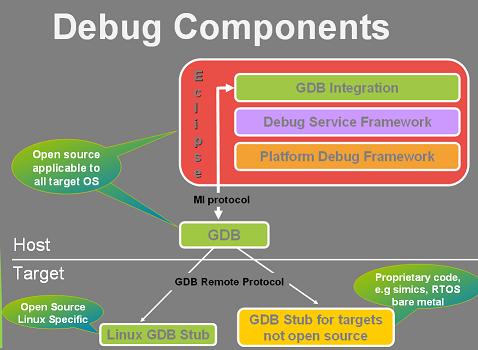Notice: this Wiki will be going read only early in 2024 and edits will no longer be possible. Please see: https://gitlab.eclipse.org/eclipsefdn/helpdesk/-/wikis/Wiki-shutdown-plan for the plan.
LinuxIDE
Contents
Linux Tools IDE
Linux is everywhere from IT server, to embedded systems, to consumer electronics, to big parallel computers. Using proprietary tools ported from proprietary operating systems is a complete turn–off for the Linux community. Having a well integrated UI for Linux tools will benefit the whole Linux community and can become de-facto standard for other type of systems. Already today open source tools like GCC, GDB, LTTng, etc. are actively developed for Linux where lots of features are available, when in a Host-Target environment all the host parts can be re-use as is on other systems, the below picture illustrate this for debugging.

The goal of the work group is to discuss/plan work in a collaborative way, some reasoning for creating this work group can be found below:
- Integrate new Linux tools features in Eclipse;
- Develop higher level Eclipse analysis,
- Promotes the Eclipse Linux Tools IDE;
- Some features requires cross projects implementation e.g. some new debug features needs to touch GDB/CDT/Debug, LTTng/kernel/Linux Tool/Trace, RSE, and the Eclipse debug platform;
- Linux developers like vi and cmd line, with multi-core and multi-process they are now looking at IDE's. Debugging multi-core systems in non-stop when attaching to many processes is inefficient to do on the cmd line.
- Integrate/package other Eclipse features for the Linux community, e.g. Mylyn, code review, eGit, etc.
- Avoid incompatible data, inconsistent work, and duplicated efforts.
- Help to have standardized formats or analysis for tools.
- Show it’s easy to add features to Linux tools, e.g. invite companies/people who can take contracts for developing new features or providing support, packaging. Many companies are modifying those tools without contributing anything back, they sometimes think it's too hard to add features into open source projects but it’s not the case;
- Facilitate the distribution of those tools.
- Find ways to facilitate tool interaction for Linux and bare metal systems.
- Decouple the tool from the Linux version, it's easy for end users to use the latest version of tools but usually they cannot upgrade the operating system, this will make it easy to use the latest tools version with older operating system version that have to be in place for many years.
- Collaborate with other organization such as the Linux Foundation, the multi-core association, etc.
In other words have a rich set of features to make it easy and fun to develop on Linux.
Participants
- Ian Skerrett, Eclipse Foundation
- Andrew Overholt, Red Hat
- Dominique Toupin, Ericsson
Meeting Minutes
Mailing List
Target Audience
- C/C++ developer writing applications on a Linux desktop and targeting Linux as a deployment platform.
- Linux deployment platform could be an embedded device, desktop or server
Potential Areas of Collaboration
- tracing
- visualization and support for distributed systems
- Editor improvements: ex. code formatting
- Scalability of indexing
- Support for static analysis
- Unified profiling
- QEMU performance
